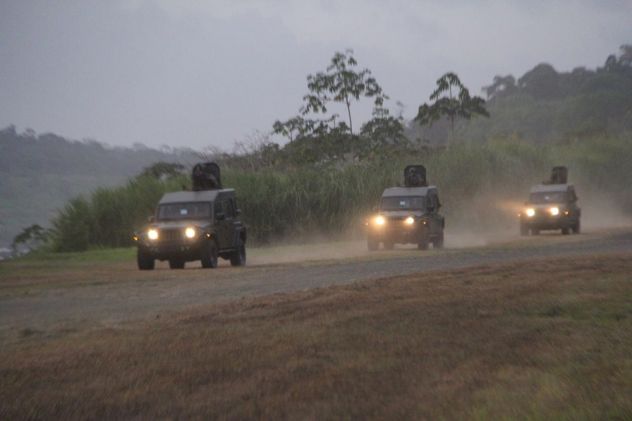The U.S. government donated 15 Jeep J8 vehicles to the Panamanian National Border Service to support the fight against narcotrafficking on the Colombian border. (Photo: Panamanian National Border Service)
In early February, the U.S. government delivered a donation to Panama to strengthen its Public Force’s security operations. The donation, a hangar, equipment, and vehicles, will support units assigned to the Darién region, on the Colombian border.
On February 5, acting U.S. Ambassador to Panama Roxanne Cabral delivered the donation during a ceremony to inaugurate the hangar at the Panamanian National Air and Naval Service’s Mayor Salvador Córdoba Air Base (SENAN, in Spanish), in Nicanor, Darién province. The hangar and the donated equipment will contribute to the fight against drug, human, and arms trafficking and disrupt the influence of transnational criminal organizations in Latin America.
“The ceremony honors the donation of almost $5 million in total, but this is just a little grain of sand compared to the daily work you do here and all along your borders,” Cabral said. “We intend to support you with the necessary resources to address emergencies and equip you for your operations against drug and human trafficking.”
The donation
During the ceremony, Cabral symbolically handed over hangar keys to Panamanian Minister of Security Jonattan Del Rosario. The hangar was built in one year and cost $2.1 million.
The hangar will be used to store and maintain SENAN’s AW109, AW139, Bell 212, 407, and 412 helicopters and other aircraft. The infrastructure, the first of its type in the air base located in the far east of Panama, also includes a warehouse to store material, equipment, and tools, in addition to office spaces, sleeping quarters, and bathrooms.
“With this hangar, we can maintain our aircraft and keep them in the area,” Commissioner Gilberto Méndez, SENAN’s director, told Diálogo. “It won’t be necessary to move them to Panama [City] to do maintenance; rather, we will be able to do it here, enabling us to have helicopters more readily available to conduct SENAFRONT [Panamanian National Border Service] operations and our own.”
U.S. authorities handed over the rest of the equipment and vehicles included in the donation to SENAFRONT and the Panamanian Police Anti-Narcotics Operations Tactical Unit. The package included spare parts for counter drug operation speedboats, night and thermal vision devices, 15 Jeep J8 tactical vehicles, two ambulances, and a tractor.
 Acting U.S. Ambassador in Panama Roxanne Cabral (left), and Panamanian Minister of Security Jonattan Del Rosario inaugurate a hangar for SENAN in Nicanor, Darién province. (Photo: Panamanian National Border Service)
Acting U.S. Ambassador in Panama Roxanne Cabral (left), and Panamanian Minister of Security Jonattan Del Rosario inaugurate a hangar for SENAN in Nicanor, Darién province. (Photo: Panamanian National Border Service)Strategic base
SENAN conducts critical tasks in the fight against narcotrafficking in Darién, such as surveillance patrols and support for SENAFRONT’s operations. The institution also contributes to humanitarian missions with rescue and medical evacuation operations in the area’s remote region.
“This base here in Nicanor is one of the main bases SENAN and SENAFRONT use to send troops into the jungle, near the Colombian border,” U.S. Army Colonel Steven Wikleman, chief of the U.S. Embassy’s Security Cooperation Office in Panama, told Diálogo. “This is important, because these are areas where ELN [Colombian National Liberation Army] and drug cartels operate. This base is key to the mission of Panamanian security forces.”
The region known as the Darién Gap consists of a dense and humid 550,000-hectare rainforest that Panama and Colombia share. The Revolutionary Armed Forces of Colombia (FARC, in Spanish) exploited the remote area before signing the peace agreement with the Colombian government in late 2016. However, FARC and ELN dissidents, as well as other transnational criminal groups, use the region to transport drugs bound for the United States and commit related crimes.
Long-standing friendship
Panama and the United States maintain a solid relationship with bilateral cooperation agreements and support for the Public Force with equipment and vehicle donations. In November 2018, the U.S. government donated two Boston Whaler boats to SENAN, valued at more than $1 million.
“Both governments ratified our security cooperation commitment,” said Del Rosario. “We created and maintain a high-level dialogue between security authorities. We meet periodically to develop and execute our common strategies against transnational threat networks.”
Panamanian security forces increased their operations throughout the country. In late 2018, Panama launched Operation Shield (Operación Escudo) to disrupt narcotrafficking routes in border areas with Colombia and Costa Rica. The operation, ongoing until September 2019, resulted in the seizure of more than 25 tons of drugs and the capture of more than 120 criminals.
“We proved that each dollar invested for cooperation in Panama yields good results,” Del Rosario concluded. “On behalf of the government, the Ministry of Security, and the Public Force, I want to thank the United States for their unconditional support to our forces, so that we can continue to strengthen bonds of friendship and carry out the mission of protecting and serving our citizens, preventing violence, and countering common and transnational crime.”
